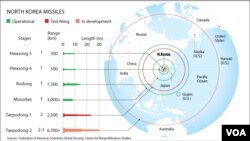SEOUL —
For the first time, North Korea is threatening to launch a pre-emptive nuclear strike. This is the latest in an increasing series of bellicose rhetoric from Pyongyang in recent days.
The threat, attributed to a spokesman from North Korea's foreign ministry, was carried by the country's central news agency and also broadcast Thursday.
The ministry spokesman is quoted as saying that because "the United States is about to ignite a nuclear war, our revolutionary armed forces will be exercising our right to pre-emptive nuclear attack against the strongholds of invaders in order to protect our supreme interest.”
2006
2009
2013
Earlier in the week, a four-star general went on television to announce North Korea next Monday would abrogate the 1953 armistice, which halted the three-year devastating Korean civil war.
North Korea has made no secret it is incensed about fresh sanctions against it by the U.N. Security Council. It is also expressing strong displeasure with annual military drills under way involving American and South Korean forces.
The North claims the joint exercises are a pretext to a nuclear attack by the United States.
The commander of U.S. forces in South Korea, General James Thurman, issued a statement expressing concern about Pyongyang's threat to cancel the cease-fire agreement. He noted [that] as leader of the U.N. Command on the peninsula he is "charged to fully enforce the conditions of the armistice."
The cease-fire document was signed by military commanders from China and North Korea on one side and the U.S.-led U.N. Command on behalf of the international community. South Korea was not a signatory.
The two Koreas have since remain divided, no peace treaty was ever written and thus Seoul and Pyongyang never established diplomatic relations.
The United States maintains more than 28,000 military personnel in South Korea.
The threat, attributed to a spokesman from North Korea's foreign ministry, was carried by the country's central news agency and also broadcast Thursday.
The ministry spokesman is quoted as saying that because "the United States is about to ignite a nuclear war, our revolutionary armed forces will be exercising our right to pre-emptive nuclear attack against the strongholds of invaders in order to protect our supreme interest.”
North Korean Nuclear Tests
North Korean Nuclear Tests2006
- Carried out underground at Punggye-ri
- Powered by plutonium
- Released radioactive materials
2009
- Carried out underground at Punggye-ri
- Seismic signals were consistent with a nuclear test
- Radioactive material was not detected
2013
- Carried out underground at Punggye-ri
- Seismic signals were consistent with a nuclear test
- Estimated to be more powerful than devices tested earlier
North Korea has made no secret it is incensed about fresh sanctions against it by the U.N. Security Council. It is also expressing strong displeasure with annual military drills under way involving American and South Korean forces.
The North claims the joint exercises are a pretext to a nuclear attack by the United States.
The commander of U.S. forces in South Korea, General James Thurman, issued a statement expressing concern about Pyongyang's threat to cancel the cease-fire agreement. He noted [that] as leader of the U.N. Command on the peninsula he is "charged to fully enforce the conditions of the armistice."
The cease-fire document was signed by military commanders from China and North Korea on one side and the U.S.-led U.N. Command on behalf of the international community. South Korea was not a signatory.
The two Koreas have since remain divided, no peace treaty was ever written and thus Seoul and Pyongyang never established diplomatic relations.
The United States maintains more than 28,000 military personnel in South Korea.












